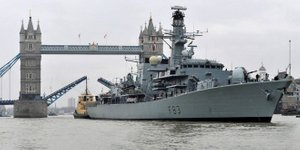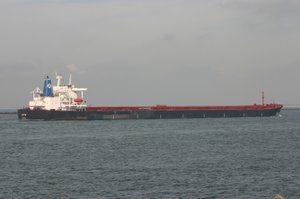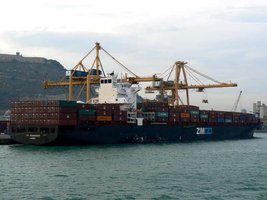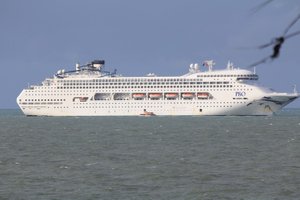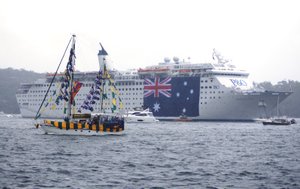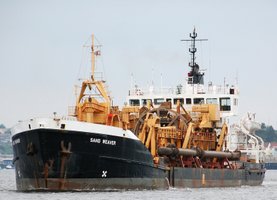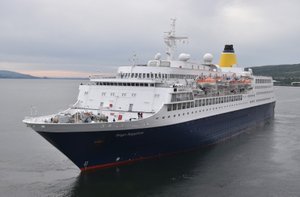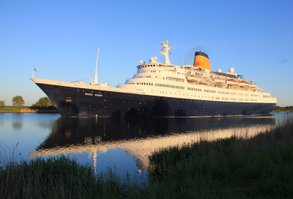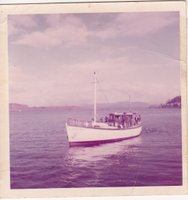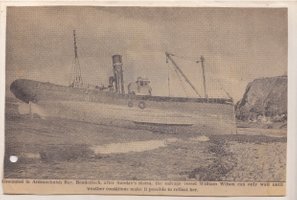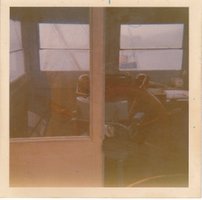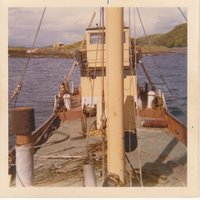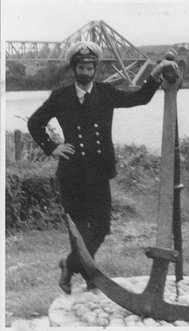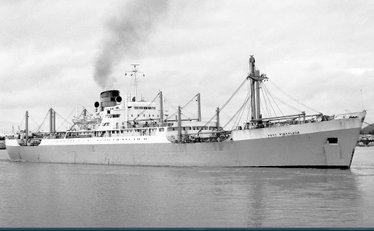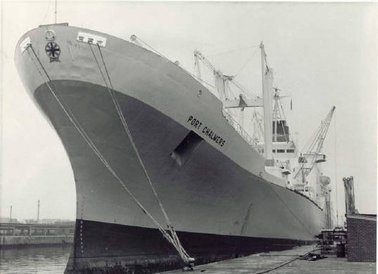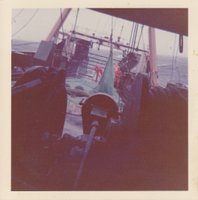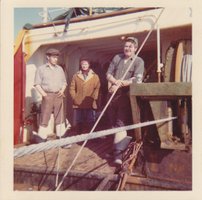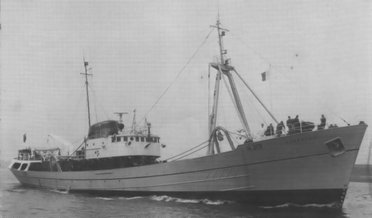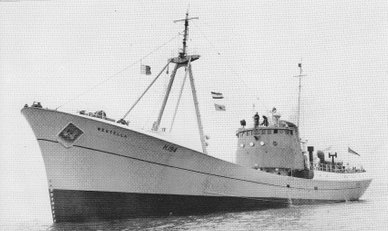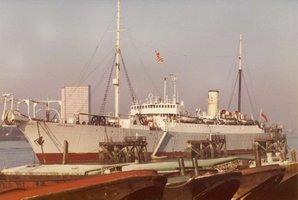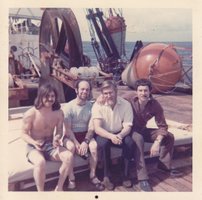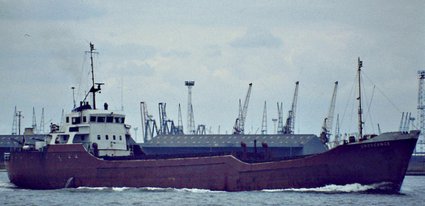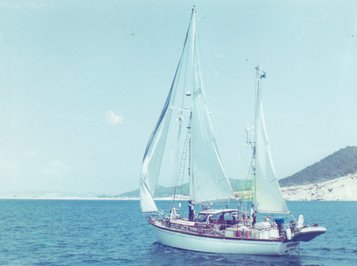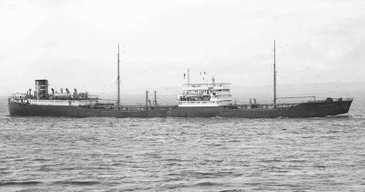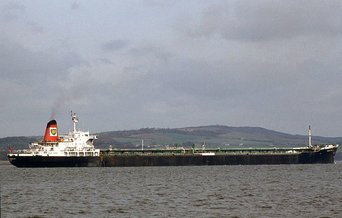CAPTAIN DAVID LLOYD SHAW, b.1984
The Shaw family have been associated with Borth for over a century. They were industrialists based in the Midlands, some of whom were of Welsh descent as indicated by the continual use of the name Lloyd down the generations. The Shaw's owned several properties in Borth at various times, namely Saxatile, Bwythen Bach and Morwylfa. David's great great grandfather Alderman Thompson, Mayor of Wolverhampton, built Dunstall. Dunstall had a wonderful iron stairway leading down to the beach below the cliff, which has now eroded away. It's parts were made in the family factory and then transported to be assembled on site. At the top of the stairway was a feature that friends and I regarded with awe as it was a beautiful galvanised gate in the form of an anchor.
David's grandparents, David and Sylvia Shaw, not only lived at various Borth properties, but had a penchant for travelling and lived in Ireland, New Zealand, Scotland, Cornwall, Devon, Somerset and Essex, before finally retiring to Borth. All the children inherited the love of travelling and have lived in various locations around the globe.
David's father's career saw the family reside for a time in Germany as well as in the Oxford area before settling at Borth. His parents Jonathan and Lorraine bought the family home Morwylfa after the death of Jonathan's parents David and Sylvia.
As has often been the case, the sea at Borth was a constant presence in David Lloyd Shaw's childhood, so it was no surprise that he chose a naval career. At 16 he joined the Royal Navy serving for 5 years as an able seaman on the H.M.S. St Albans type 23 frigate, pennant no. F83. During this time he voyaged to Scandinavia and Russia. From these cold waters he was then posted to the heat of the Middle East to prevent arms smuggling by the Iraqi regime in the Straits of Aden.
H.M.S ST.ALBANS
After his time in the Royal Navy he worked briefly on the private yacht Rum Jungle of Southampton prior to gaining an officer cadet-ship with Clyde Marine and Zodiac Maritime Agencies. He served on the motor vessels Zim Busan, Irfon a bulk carrier, Ym Shanghai a container ship and the Zim Shenzhen. Voyages on these vessels took him to many ports in China, the U.S.A. as well as The Levant.
RUM JUNGLE IRFON ZIM SHENZHEN
For a time he was 1st Mate on a sailing tug Svitzer Trimley of Lowestoft. His next posting was as 3rd Officer on P&O cruise ships travelling to the Antipodes and the Pacific Islands. These were Pacific Sun and the Pacific Dawn.
PACIFIC DAWN PACIFIC SUN
He was then on a marine dredger the Sand Weaver belonging to South Coast Shipping that worked all round the British coast. He was on her for a year as 2nd Mate.He then worked for Swire Pacific in the Middle East, servicing oil rigs and anchor handling; these were essentially big tugs. For the next 4 years he served as 2nd Mate on Saga Cruise ships and covered the Chief officer's duties and was promoted to 1st Mate on the ships Saga Pearl 11, Saga Ruby, Saga Sapphire and the Quest for Adventure.
SAND WEAVER SAGA SAPPHIRE SAGA RUBY
The worst storm he had been in was whilst on the Zim Sehzhen in the Bering Sea between Alaska and Russia where there were gusts of wind over 100 knots, which meant slow steaming to manage the terrible sea conditions. He remembers when he was in the Royal Navy when he had a very disturbing experience whilst on watch on the St Albans. The P&O ferry Pride of Le Harve, came into Dover Harbour and rammed and badly damaged the St Albans. Essentially the harbour-master should not have allowed her to enter port. With all his experience he found that gaining his Chief Mate's unlimited licence was the most difficult task he undertook. David states that getting his Masters ticket was almost a doddle after that.
JONATHAN ROBERT LLOYD SHAW B.1961
David's father Jonathan Robert Lloyd Shaw, also spent a brief time at sea before taking up a career in the army. At 15 years of age Jon persuaded his mother to allow him to leave school as he had no academic interest and was in thrall to his older brother Andrew's adventurous life. Jon did not go through any sea training school but got a job as a deckhand on a small coaster the Bertie, based in Saltash Cornwall. His next ship was obviously foreign built ship as all the signage on board was either in Dutch or German...he is still not sure which. His father David was influential in getting him this job as at the time he was working on the Thames Barrier. After voyaging around the British coast and crossing the channel to Belgium for 4 or 5 trips he then joined Crescent Shipping Co. of Rochester. He was now on larger vessels but still traversing the English Channel between British and European ports. His last voyage saw him end his short maritime career in Leith as by now his brother Andrew had joined the Royal Marines and he wanted to follow in his older brother's footsteps. His mother dissuaded him from joining the Marines and trying to emulate Andrew who had at that time had just been awarded the Kings Medal and was the top cadet of his year. His mother did not want Jon to be disappointed. Eventually he joined the Royal Army Ordnance Corps, nowadays Royal Logistics Corps. Jon had been at sea for 2 years and at 17 years of age he began a 23 year career in the army. After leaving the army he and his wife Lorraine ran a boat yard at Falmouth for 4 years and for part of that time he and his family lived on a boat. He worked as a lorry driver whilst looking after the boatyard and has recently moved to the Norfolk Broads where he continues to berth his boat whilst still lorry driving.
ANDREW DAVID SHAW b. 1954
David's uncle, Andy, ran away to sea when he was 15. He was to have a long adventurous life with a switch of career that saw him serve in the Royal Marines, reaching the rank of Major.
Whilst a teenager Andy's parents were running their hotel, “The Lochnell Arms”, at Connel, near Oban in Argyllshire, Scotland. His boyhood imagination had been fired by listening to the stories of a former naval man, Boyd Keene, who was a regular at the hotel bar. Approaching 16 he was supposed to be studying for his “O” levels, having told his parents that he was staying with friends to cram for his exams. Both parents were blissfully unaware that this was not quite true, as they were used to him packing a rucksack and going off camping for days on end. Andy's school assumed that he was ill at this time. Having dodged the “O” levels he ended up as a volunteer crewman on the last Scottish steam drifter in existence, the SS William Wilson, which was built by Alexander Hall and Sons in Aberdeen in 1922. She was now a sadly neglected, rusty old vessel, engaged in salvaging the bronze propeller off the wreck of the SS Breda, a cargo ship that had been sunk by a German Dornier bomber in Lochnell bay in W.W. 2. As Andy states, this was highly dangerous as there were lots of unexploded ordinance around the wreck site.
Old 797 Skipper
SS William Wilson ashore in Lochnell Bay after her anchor chain parted in a gale.
Andy was constantly volunteering to crew on various yachts as an unpaid crew-member. His next interest was fishing vessels and he became a crew member of the seine netter Golden Harvest of Oban.... all he remembers was a lot of vomiting. It was not long before he got another job, again without pay, on a small Hebridean island-hopping diesel puffer called the Marsa, Skipper Hughie McCall This vessel once carried the helicopter for the James Bond film “From Russia with Love”, parts of which were filmed of the Isle of Mull. During all this time his parents were innocently unaware of these truancies.
The Puffer Marsa
Eventually reality dawned for Andy, and he became an indentured navigation apprentice for Blue Star Port Lines Ltd. His first vessel was the MV Port Nicholson, Captain Ronald “Darkie” Finch, Extra Master Mariner, out of London, and he was soon put to work cleaning the grease on the monkey island. An hour later, after several purposeful mis-directions from crew members, he was instructed to climb on the roof of the bridge and clean it. There he was confronted by a rotund, very tanned person who asked Andy “what the hell do you think you're doing, and who are you”? Andy answered that he had been sent up there to “clean a pile of grease”. The totally naked man shouted “get off my bloody bridge at once” ….it was the Captain. This vessel carried passengers and general cargo. The Port Nicholson went to Glasgow in ballast to have her bottom painted and then to begin loading a partial cargo, before calling at Liverpool to complete loading. Andy then went on his first deep sea voyage. They had a near miss off the Straits of Gibraltar when a tanker crossed their path with nobody on the bridge except for a lone dog, despite his ship blasting the air with their siren repeatedly and executing an emergency “wheel-hard-to-port” turn to avoid collision!
Navigating Apprentice Blue Star Port Lines AD Shaw
(The beard was done with a biro, for effect, and to enhance my prospects for further employment)
Just two days north of Cape Town, off Walvis Bay, they answered an emergency call from the Shell tanker Esso Ulidia. She had suffered a boiler explosion that killed three of her crew. Andy took the doctor across in the lifeboat to patch up the injured and certify the dead.
His first port of call was Cape Town, where he climbed “The Lions Paw” in Port Line blazer and tie. That was his only excursion ashore due to the rigorous laws of apartheid regime that kept blacks and whites separate. On the next leg, across the Southern Ocean towards Western Australia, on a route that took them down into the Roaring 40’s they went to the aid of an SOS sent out by the bulk carrier MV Henna. She was breaking up in heavy seas. They found nothing. She and her crew had vanished.
On arrival in Fremantle they found the port shut down as the aircraft carrier the H.M.A.S. Melbourne had been in collision with the USS Frank E Evans during a joint naval exercise, killing 74 of her crew, and some wag had sent both navies into the same port. There were running battles in the streets between the Aussies and the Yanks.
From there they called in at Melbourne, Sydney and Brisbane, discharging the cargo before sailing in ballast across the Tasman Sea to New Plymouth, New Zealand to begin loading lamb, butter and cheese. On Christmas day she rounded the North Cape on her way to Auckland, where she completed loading by the middle of January. It was reported in the local press that the MV Port Nicholson had loaded the biggest cargo ever to leave New Zealand. All six refrigerated holds were stuffed to the gunwhales with lamb, butter, cheese and strawberries, and had ample deck cargo consisting of hides, wool and tallow lashed on top of them as well. The vessel was so deep in the water that it took three tugs and her engines going astern to drag her out of the mud at the wharf.
MV Port Nicholson
From Auckland she began her passage home right across the Pacific Ocean, via Pitcairn Island to drop off dunnage and nails, through the Panama Canal and onto Curacao for bunkers, before leaving the Caribbean via the Mona Passage; destination Berry Head, Devon, for the channel pilots. They ran into a huge storm as she entered the Gulf Stream, which saw them rolling through 40 degrees for three weeks right across the North Atlantic, and which destroyed a significant portion of the deck cargo, despite the steel lashings. They arrived off a mercifully calm Berry Head in mid-winter and Andy fondly remembers the entire country being covered in snow. To cap it all, as she finally tied up in KGV dock (now London City Airport), out of the shadows, beneath the grey cargo sheds in the winter gloom, he saw his parents approaching to welcome him home. They had driven all the way down from Oban.
Andy made two circumnavigations of the globe on this vessel. His last voyage with Blue Star Port Lines was on the MV Port Chalmers Captain Hawkins, Master Mariner, which completed his third circumnavigation of the world, and included going up the Tamar River to Launceston, Tasmania, to pick up apples and in New Zealand visiting Invercargill, Timaru, and Bluff, the southern-most port in the world.
MV Port Chalmers
As ever in Andy's life there was a change of direction so as to avoid having to improve his maths and other navigational studies. This meant shore time and going back to school. He decided this was not on, especially as a shipmate from Hull on the MV Port Chalmers had just come out of the fishing industry. Andy quickly decided that fishing vessels were the next move in life.
He was coming up to his 18th birthday when he joined J. Marr's and Sons Ltd, one of Hull’s biggest trawler companies, to do a fishing apprenticeship. He joined the freezer stern trawler FV Swanella whose skipper Ted Fox, made life unbearable. They fished the White Sea, Iceland, Bear Island and to the edge of Russian waters. For 3 months he worked 12 hours on and 12 hours off. Andy recalls extreme weather, terrible food and the unpleasant experience of 12 hours of cod gutting at a time. One member of the crew had tormented him since the first day; a classic case of bullying a new boy. He remembers with relish catching up with his tormentor and giving him a thrashing. Ever the romantic, Andy had always wanted to fish from an old-fashioned side trawler, known as side-winders, with the catch placed on ice instead of being frozen in blocks, These were 21 day voyages to Iceland or the White Sea with three days ashore between trips.
F.V. SWANELLA OFF ICELAND SWANELLA CREW
His next trip was on the FV Benella skippered by Harry Eddom, the sole survivor of the triple trawler tragedy in the winter of 1968, when 56 trawlermen lost their lives due to extreme bad weather. The trawlers St. Romanus, Kingston Peridot and Ross Cleveland were all lost in the space of a few weeks of each other, off the North coast of Iceland. Harry was the mate of the Ross Cleveland and was on top of the bridge smashing ice off the steel in an horrendous Arctic gale when she went over due to the weight of ice on her upper works. Hull was in deep shock and the town's womenfolk revolted, causing many important safety changes to be implemented by the government.
Having abandoned his second apprenticeship in favour of simple graft, Andy ended up on the foredeck of many sidewinders, initially as a Deckie Learner, and then as a qualified Spare Hand. Andy worked the normal watch system which was 18 hours on and 6 off. This was during the time of the second Cod War with Iceland. There were gunboats everywhere and they had to keep moving location to avoid having their warps cut in very dangerous manoeuvres executed by the Icelandic gunboats. Fishing had originally been allowed inshore, 3 miles off the Icelandic coast, but then eventually was moved to 200 miles offshore; thus cutting off all of the northern fishing grounds available to British trawlers. Politics destroyed the British trawling industry and the writing was on the wall as far as a career in fishing was concerned. Andy reckoned that on such vessels were the finest seamen since the age of sail!
After many happy trips in the FV Benella his next sidewinder was Marr’s Starella, the smallest trawler in Hull. She set off for the Greenland grounds and the Denmark Strait, fishing near the wreck of HMS Hood, which had been sunk by the Bismark with the loss of all but three hands. After filling the fishroom with prime cod and haddock they came home in a Westerly Force 9 gale which created a huge following sea. At one point, running fast for the market, she was pooped and a monstrous “greeny” came aboard and cleared the boat deck, stove in the aft-facing bridge doors and flooding the bridge. This caused a scuffle between the skipper and the mate, who had different ideas about how to stay alive. Fortunately, common sense prevailed, and she eventually arrived safely to land a good catch. Andy was paid well for that voyage, over £300, most of which was eventually spent in Rayners pub on the Hessle road and in various tailors, creating new and ever-more garish outfits with which to dazzle the local ladies.
Starella off to Iceland
His next trawler was the FV Westella, the fastest sidewinder in Hull as she could reach 19 knots. This vessel fished around Bear Island and off Spitzbergen. The skipper was known as “The Pennine Beast” as he had scoured the dock in Fleetwood for crew but eventually no-one sailed with him twice. He was only concerned about fish and the crew came a poor second, and it was on this trip that Andy nearly lost his life. The weather was bad, a Force 8, and the ship should have been laid, or dodging, but instead the skipper kept on fishing. There was also a lot of icing building up, due to the extremely low temperatures, which affected the ship’s stability. Andy and other crew-members were pulling the trawl in using the old-fashioned way of hand-over-hand - a method long out of style but preferred by the skipper, when he was the only one who did not hear the order to “LET GO” as a huge wave came aboard. He ended up in the sea and just managed to untangle himself and climb back onboard. Andy's fishing career ended after that trip.
FV Westella swinging compasses
His next ship was the ancient steam reciprocating, twin screw, cable layer John W Mackay, Captain Harper, Master Mariner, the oldest working ship on Lloyd’s register, where he was the youngest and most experienced quartermaster of three, working for 3 months laying a cable from Sardinia to Italy across the Tyrrhenian Sea. This vessel carried 50 uncertified deck hands as human muscle was needed in both in loading and offloading.
Cable layer John W Mackay
Quartermaster Shaw trying to ingratiate himself with reluctant DHU
He then moved to the deep sea gravel dredger MV Deepstone as 2nd mate, which operated around the North Sea sucking up gravel in all weathers and carrying it to French, Dutch and English ports. He also operated in this capacity on similar specialist ships for the South Coast Shipping company on the MV Rockstone and the MV Sand Serin. He was also 2nd Mate on the small general cargo coaster the MV Crescence, Captain “Windy” Whiteman, running up and down the Irish sea carrying coal, from Ayr in Scotland to Barnstaple for the power station at Yelland on the river Taw. Finally, on another coaster, the M.V. Toward of the Glen Line, again as 2nd mate, he coasted around the northern European ports, from Rotterdam to Rouen, to Cork, Dundalk, Warrenpoint and Londonderry, not knowing that he would return to some of these desperately troubled areas in a few year’s time, having swapped his sou’wester for a green beret.
After getting married it was time for another change, he gave up his career at sea and tried his hand at various labouring-type jobs ashore, none of which lasted very long. After nearly 7 years at sea it was time for a change.
MV Cresence
Ever the adventurer he joined the Royal Marines. He was awarded the King's Badge as top recruit. He went on to do 5 tours of 6 month duration in Northern Ireland, as well as being heavily involved in the Falklands War where he was a rifle troop commander in 45 Commando Royal Marines. By 1980 he was a 2nd Lieutenant and then, commissioned from the ranks, came out top twice in special training. He is just one of five men in the 355-year history of the Corps to hold both awards. He was in the Marines for a total of 20 years and rose to the rank of Major; quite an achievement for a person who was missing at exam times. Andrew's career decisions were underpinned by his boys own adventure attitude, whereby a degree is not necessary to explore and experience the world whilst gaining a fulfilling life...as Andy has done.
His love of the sea was, and still is, undiminished, as he spent 18 years living on the ketch My Fair Lady, with his second wife Cheralie, initially in Plymouth during the last five years of his service in the Royal Marines, and then eventually the Balearic Islands, off the east coast of Spain. In the last decade he has written a novel based on some of his experiences in the Falklands War entitled “The Man in the Mist”, and has been unstinting in setting up a charity called The Mountain Way to help rehabilitate ex-military P.T.S.D. sufferers. He has, and is still, living a full life.
Atlantic Power Ketch My Fair Lady off the south coast of Ibiza
No doubt his nephew, Captain David Shaw, was inspired by his Uncle's experiences and tales when he visited his parent’s home at Borth. Andy is still a frequent visitor, as sixteen of his close relatives live in Borth permanently and have become thoroughly ingrained in the life of the village and West Wales in general.
HUGH EDWARD JOHN WAKELIN b. 1952
Andrew and Jonathan Shaw's brother-in-law, Hugh, born in Somerset, signed up with the B.P. Tanker Company as a navigation cadet (midshipman) in 1970. After an initial 3 months training at the Plymouth Merchant Navy training college his first ship was the M.V. British Commodore. At the time this vessel was the lead ship in the B.P. Fleet and was commanded by Captain Baty who was also the Commodore of the whole fleet. Hugh says that he was the most grumpy individual one could ever meet as he was of the old school with no time for idiots or anything else other than commanding the fleet. This vessel was built in 1967 at Fairfield Glasgow and she was broken up in 1982 in Thailand.
His next ship was a small coastal tanker plying its trade around British and European seaports. The British Patrol was built in 1954. in 1973 she was renamed Maripatrol by a Famagusta shipping company. By 1980 she was owned by the Fiorita Maritime Agency, Pireaus and renamed Nona Maro. By 1981 she was broken up at Cartagena after being damaged by a major explosion and fire.
British Patrol
During his time at sea he visited many ports. He remembers in Ravenna Italy whilst on the Commodore he was taken out on a small tug to an offshore floating pipeline and a rope ladder was thrown down for him to climb up the 50 or so feet. He was very nervous and asked if they were joking but was told in no uncertain terms to”get himself up immediately”. Whilst in Tobruk Libya he saw an impressive monument to the slain at the Second World War site. He enjoyed Portland Maine which was under a deep blanket of snow when they were discharging crude oil there, and despite being only 18 he was able to buy beer even though he was under age, which is 21 in America. After crossing the Atlantic in very rough weather some time was spent at Lagos carrying out repairs. He was looking forward to visiting Cape Town but unfortunately the crew were not allowed ashore as there had been an incident where many people had been killed. He did however manage to see Table Mountain as they left.
British Commodore
When his ship was loading crude oil at Das island in the U.A.E. Little did he realise that it was going to be his future home 8 years later. The place was amazing as gas from oil wells were flaring noon, night and day belching out flames and thick clouds of sulphurous black smoke. He thought to himself “you will not catch me working here”... famous last words. At Aalborg Denmark they ran into severe cold weather during a raging storm and they were the last to discharge crude oil supplies to the city before the port was iced in and closed for winter. On return from Denmark they had to go to the dry dock as urgent repairs were needed to the ships undercarriage as all instrumentation fitted to the hull had been torn off whilst manoeuvring to dock at Allborg.
Whilst on the M.V. British Patrol he got into trouble in Hamburg. He got drunk, drugged and robbed and ended up in a sorry heap in a shop doorway. In desperation he managed to get a taxi to port but having no money ran off and lost the taxi man before making his way back to the ship where he collapsed and slept. This did not last long as he was prodded awake by 2 German policemen with machine guns, and an enraged taxi driver shouting abuse at him. Luckily the second mate paid them off and promised to keep him in his room until the ship left port. The punishment for all this was that he was not allowed ashore for the next 2 ports. The ship visited Amsterdam, Antwerp, Copenhagen, Dublin, Grangemouth, Hull, Grimsby and Tilbury. Hugh went ashore with an engineering cadet and visited his new pals family at High Wycombe and a thoroughly good time was had by one and all. Liverpool was the next destination then Milford Haven where by then he was suffering a serious toothache. He was mightily relieved to have it removed by a dentist but unfortunately it got infected and he suffered more pain for the following 2 weeks until he docked and got medical attention at Dundee. This was his last port where he left the ship, left the merchant navy and returned home. He lived in Borth for 15 years and regularly returns as his three children and 7 grandchildren are all members of the village community.
Thanks to all the Shaw family for the information and photographs in this section. Captain David Lloyd Shaw is probably one of the last Master Mariners from Borth as the British Merchant tradition has almost ended. As he states, "nowadays United Kingdon's nautical schools are primarily attended by foreign students because they want the world renowned maritime qualifications". This is very sad as David has always wanted to command a cargo ship travelling the world as the old tramp steamers of Cardiff used to do. His only seagoing employment seems to be on cruise ships but David dislikes the social aspects of those positions. It is ironic that when the French and Italians build ships for companies worldwide, they insist that for 10 years the master has to come from the countries they are built in. why can't the British do this? And why can't we insist that with increasing trade with nations like China we cannot stipulate that British ships and British crews are involved as part of the trade deal.
